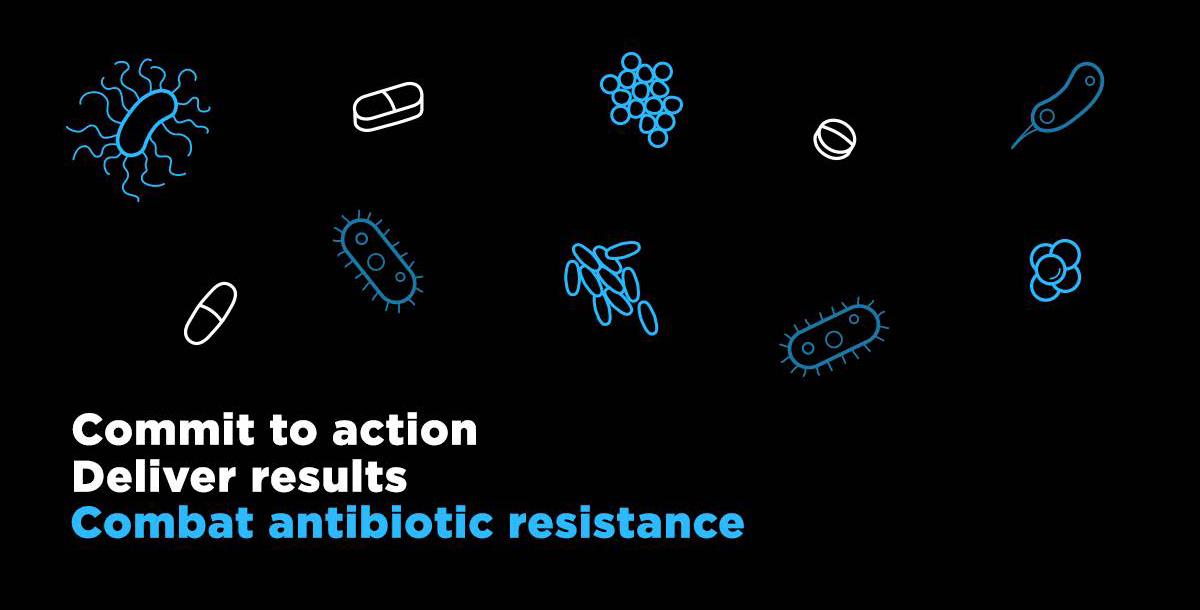By the bioMérieux Connection Editors
One year ago, on September 25, 2018, the CDC launched the AMR Challenge, a “yearlong effort to accelerate the fight against antimicrobial resistance across the globe.” Antimicrobial resistance (AMR) is a threat to health worldwide, and it could result in as many as 10 million deaths annually by 2050 if we do not take effective actions to prevent it.
The AMR Challenge is a way for organizations around the world to collaborate in the fight against antimicrobial resistance. Governments, private companies, and non-governmental organizations, “make formal commitments that further the progress against antimicrobial resistance.” The Challenge specifically, “encourages a One Health approach, recognizing that the health of people is connected to the health of animals and the environment.”
When the challenge launched, bioMérieux made three commitments to the fight against antimicrobial resistance:
- Global Point Prevalence Survey: The overall goal is to monitor rates of antibiotic prescriptions and resistance in hospitalized patients and to reduce the inappropriate use of antibiotics. Data gathered is being published and used to develop an education framework and training program for health care professionals working on hospital antimicrobial stewardship particularly in LMIC. Ultimately, we aim to potentially develop benchmarking standards including quantifiable targets.
- IMI Project: Antimicrobial resistance provides an ideal framework for diagnostic companies and pharmaceutical companies to join forces to develop a vision of how diagnostics could help to avoid future generations being confronted with untreatable infections as a result of resistant bacteria. This is the foundation of the IMI Value Dx project, an industry consortium with 7 major diagnostics companies and The Wellcome Trust to advocate on the value of diagnostics to combat antimicrobial resistance.
- Research & Development: The comprehensive bioMérieux approach is used to detect, identify, monitor, track and prevent resistance, while also working with agricultural, veterinary and pharmaceutical companies and various healthcare providers to limit resistance development and maximize the utility of existing and in-development antimicrobials. R&D projects focus on enhancing current bioMérieux platforms and tests, as well as developing innovative approaches that span the entire diagnostic spectrum from the most highly advanced technologies to low-cost, easily-accessible tests for use in low-resource developing nations.
The CDC notes that approximately 47 million antibiotic prescriptions are made unnecessarily each year in the United States (about 30% of antibiotics). Antibiotics continue to be used non-judiciously in agricultural settings, particularly on food animals. Both of those contribute to antibiotic over-use and the spread of antimicrobial resistance.
Diagnostics play a critical role in reducing antimicrobial resistance and in supporting antimicrobial stewardship programs. With appropriately applied diagnostic tools, doctors can quickly and accurately identify pathogens and their susceptibility to antimicrobial drugs, improving decision-making, patient outcomes, and reducing healthcare costs. Similarly, diagnostic tools provide veterinarians with the information they need to assist with judicious use of antibiotics in animals.
Additionally, diagnostic tools provide data for effective epidemiologic and AMR surveillance systems, which are critical for predicting, managing, and preventing infectious disease outbreaks at global, national, regional, and local levels. Hospitals and health systems can leverage diagnostic data to track infectious disease trends within their facilities and networks, including the emergence of resistant pathogens. Armed with those insights, healthcare providers can take actions to positively impact patient outcomes and improve operations across the continuum of care.
Highlighting the important role of diagnostics, bioMérieux has made significant progress on each of the three commitments made in September 2018.
The GLOBAL-PPS has been the subject of several major publications and is now recognized by international organizations such as WHO, Doctors Without Borders, CDDEP, IDSA, and BSAC. In 2019, the GLOBAL-PPS will be repeated for the 5th consecutive year. It will include a new module on healthcare-associated infections (HAIs) to support hospitals in deploying their action plans to improve the appropriate use of antibiotics.
The VALUE-Dx project officially launched on April 1, 2019. The first web-based point prevalence audit survey (PPAS) aims to record information about patients who seek healthcare for Community-Acquired Acute Respiratory Tract Infections (CA-ARTI). This will help researchers benchmark patterns of testing and antibiotic prescribing in contrasting European settings by observing what happens now in routine care. The study will run during the 2019-2020 winter season. The Platform randomized controlled trial of POC diagnostics (PRUDENCE) will happen during the 2020-2021 and 2021-2022 winter season. The project is collecting information on more than 100 diagnostics for Response to Intervention. This trial will provide evidence for the use of diagnostics for CA-ARTI to develop clinical algorithms in different settings and in various subgroups of patients.
Finally, in financial year 2018, 75% of bioMérieux’s clinical R&D budget was dedicated to diagnostic products that support the fight against antimicrobial resistance. Over the last twelve months, bioMérieux has launched multiple products in that space, and in 2019, has continued to support the existing high level of investment in diagnostics that are critical in the fight against AMR.
Opinions expressed in this article are not necessarily those of bioMérieux, Inc.



